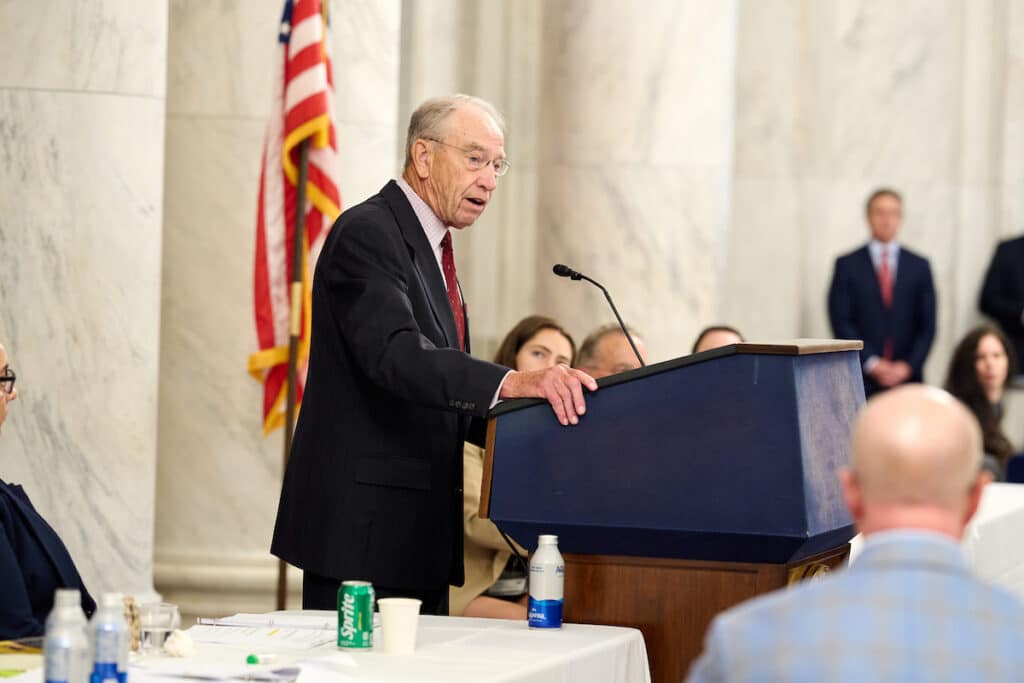On October 10, Senator Chuck Grassley (R-IA) sent a letter to Attorney General Merrick Garland at the U.S. Department of Justice and Christopher Wray, Director of the Federal Bureau of Investigation, urging the two agencies to take immediate action to remedy their alleged longstanding culture of workplace sexual harassment and historic negligence in investigating child exploitation cases. The Bureau’s handling of sexual exploitation and harassment, both inside and outside of the Bureau, is a decades-long problem that Grassley has probed into over many years. This most recent letter follows two years of silence and inaction on behalf of the Bureau.
In October 2022, Senator Grassley released internal memos from the Bureau, revealing a culture of rampant workplace sexual misconduct. Whistleblower disclosures revealed that lower-level employees were punished more severely than higher-ups for similar workplace sexual misconduct. Higher level employees had a pattern of resigning after allegations surfaced, successfully evading reprimand or accountability. The memos revealed that between 2004 and 2020, 665 employees left the Bureau in such maneuvers.
Shortly before making these memos public, Senator Grassley sent a letter to the Bureau in October 2022 requesting information about the allegations, including the Bureau’s measures to hold employees accountable and data on these voluntary retirements. In response to an Associated Press article about the letter in 2022, FBI Director Christopher Wray promised to follow up on Grassley’s probe. Two years and one Senate Judiciary Committee oversight hearing later, the Bureau has yet to do so.
Grassley’s recent letter calls this lack of response a willful obstruction of his investigation and suggests that a conflict of interest may be at the root, stating the reason the agency “can’t straighten out their problems of workplace harassment is that the fox is guarding the hen house.” Shortly after the Executive Assistant Director of the Human Resources Branch of the FBI, Jeffery Sallet requested a review of the pattern of resignations, Sallet himself stepped down following allegations that he was harassing female employees.
The Bureau’s de-prioritization of sexual misconduct extends far beyond internal allegations, notes Grassley’s letter. The Bureau has a decades-long history of failing to investigate child sex abuse claims, harkening back to Jane Turner’s 2004 whistleblower disclosures that revealed the Bureau actively covered up child sex abuse on American Indigenous reservations in 2003. More recently, this pattern has continued as the Bureau fails to provide adequate investigatory resources to the division. Protected whistleblower disclosures have revealed that the agency reassigned personnel from child exploitation cases to investigations into January 6th. However, this reallocation of resources was wholly disproportionate to the respective division’s caseloads. Grassley cites a whistleblower disclosure that stated there “was so little work to be done that the agents sat ‘essential idle for 8 to 9 months’ while child sexual abuse cases piled up.” Idle agents, acknowledging the priority of child sex crime cases, eventually “continued working child exploitation cases because of their importance but logged the hours as JTTF work, which allegedly was the requirement.”
The Bureau’s decision to relocate agents left the division without adequate resources to investigate these heinous crimes, stripping capacity from an already overwhelmed division. As a result of the Bureau’s mishandling of child sex abuse cases and investigative priority, the average caseload for agents assigned to child sexual exploitation cases has risen drastically from 26 total investigations to 56 in the last five years.
Grassley’s letter demands a response from the FBI to 11 enumerated questions regarding internal failures to stop workplace sexual harassment and structural failures that have perpetuated the agency’s mishandling of child sexual abuse cases. Grassley calls for data responsive to his requests from two years ago, along with more information surrounding Sallet’s departure from the Bureau and recent actions by the agency to remedy their historic failures in investigating child sexual abuse cases.
